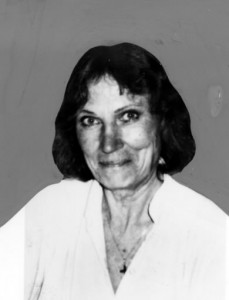Kaleria Drago, Russian A-bomb survivor, dies at 93
Jun. 17, 2015
It has been learned that Kaleria Drago, a Russian who experienced the atomic bombing of Hiroshima, died of cardiac failure in Long Beach, California on December 30, 2014. She was 93. Ms. Drago’s eldest son, Anthony, informed the Hiroshima Peace Memorial Museum of his mother’s death on June 9. Apparently, with the death of Ms. Drago, all the Russian survivors of the Hiroshima bombing have passed away.
Ms. Drago grew up in Hiroshima after her parents defected from Russia to Japan following the Russian Revolution of 1917, and her father worked as a music teacher at Hiroshima Jogakuin School from 1926. On August 6, 1945, her parents, her brother, and Ms. Drago herself experienced the atomic bombing while at home in Ushita-asahi, located in today’s Higashi Ward. When interviews of A-bomb survivors were carried out by the U.S. Strategic Bombing Survey, starting in November 1945, she offered her account of the atomic bombing and its aftermath.
After the war, Ms. Drago worked for the General Headquarters of the Allied Forces (GHQ), then married an American and moved to the United States. Her parents followed. In 1986, she was invited to the 100th anniversary of the founding of Hiroshima Jogakuin Senior High School, and returned to Hiroshima for a visit. She submitted the names of her father, Sergey Palchikoff (who died in 1969 at the age of 76) and her mother, Alexsandra (who died in 1985 at the age of 87) to be added to the register of A-bomb victims in Hiroshima, and donated her father’s violin to the school.
In 2009, it was confirmed that 13 Russians from six families were exposed to the atomic bombing of Hiroshima, and five had died by the end of autumn 1945. The other survivors moved to such places as Kobe, the United States, and Australia. In an interview with the Chugoku Shimbun, Ms. Drago once said in Japanese, “The atomic bombing was a nightmare. I’m totally against the use of nuclear weapons.”
(Originally published on June 10, 2015)
Ms. Drago grew up in Hiroshima after her parents defected from Russia to Japan following the Russian Revolution of 1917, and her father worked as a music teacher at Hiroshima Jogakuin School from 1926. On August 6, 1945, her parents, her brother, and Ms. Drago herself experienced the atomic bombing while at home in Ushita-asahi, located in today’s Higashi Ward. When interviews of A-bomb survivors were carried out by the U.S. Strategic Bombing Survey, starting in November 1945, she offered her account of the atomic bombing and its aftermath.
After the war, Ms. Drago worked for the General Headquarters of the Allied Forces (GHQ), then married an American and moved to the United States. Her parents followed. In 1986, she was invited to the 100th anniversary of the founding of Hiroshima Jogakuin Senior High School, and returned to Hiroshima for a visit. She submitted the names of her father, Sergey Palchikoff (who died in 1969 at the age of 76) and her mother, Alexsandra (who died in 1985 at the age of 87) to be added to the register of A-bomb victims in Hiroshima, and donated her father’s violin to the school.
In 2009, it was confirmed that 13 Russians from six families were exposed to the atomic bombing of Hiroshima, and five had died by the end of autumn 1945. The other survivors moved to such places as Kobe, the United States, and Australia. In an interview with the Chugoku Shimbun, Ms. Drago once said in Japanese, “The atomic bombing was a nightmare. I’m totally against the use of nuclear weapons.”
(Originally published on June 10, 2015)








